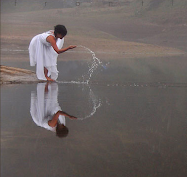In her talk Indigenous Filipino Values: A Foundation for a Culture of Non-Violence" prepared for the forum "Towards a Culture of Non-Violence," Katrin de Guia defines several key concepts which underpin babaylan practices.
KAGANDAHANG LOOB
The last core-value of the Filipino personhood is kagandahang-loob or “shared nobility.” The dictionary renders the term kagandahang-loob as a very general concept that emphasizes the beauty of something. It’s meaning is so broad that the notion stands for “anything good about something”. It is also translated as generosity. Kagandahang-loob acts like an anchor that grounds kapwa and pakiramdam in the enduring ancestral beliefs and convictions of Filipino IKSP. These are basically: God is good. Life is about learning, creating and sharing. It is good, even if there are hardships. Every sunrise brings a new day, a new horizon. There is always hope.
Kagandahang-loob, this “shared inner nobility” or “shared humanity” is a Filipino value that would nudge a person towards genuine acts of generosity; towards a nurturing that has its origin in genuine feeling for others-- empathy.
The Philippine historian Reynaldo Ileto pointed out how important the strife for a noble character was among the historical Filipino heroes.
He wrote that these bayanis reminded their followers that nobility had to be re-won every day. They also taught that it was ok to be rich, as long as the external signs of power were matched by an equally beautiful character.
How does nobility translate into every day activities? An unobtrusive kindness and caring? A sense of feeling responsibility for others? A compassion for all living beings? Are these characteristics important for cultivating a culture of non-violence? What do you think?
In summary, the three core-concepts of the value-structure of the Philippine personality theory are kapwa, pakiramdam and kagandahang-loob, interpreted as Shared Identity, Shared Inner Perception, and Shared Humanity. These values outline the profound humanistic inclination of the Filipino. And it is plain to see how such values are a seedbed for a culture of non-violence.
As for the other values of Enriquez’ Value System Of Philippine Psychology, we will skip most of them. But there is that one societal value kalayaan, which merits attention. This value stands for the untamed need of all living species to be free.
What are societal values? These are convictions that are deeply rooted in the ancestral heritage of a people. Such dispositions direct the personal values of an individual in profound and unquestioned ways.
Katrin M. de Guia performed her pioneering research on the Filipino culture-bearer artists all over the country while earning her PhD in Filipino Psychology (Sikolohiyang Pilipino) at the Unversity of the Philippines. She will be a featured speaker at the Center for Babaylan Studies 2010 Conference
Links accessed 6/24/2009
Subscribe to:
Post Comments (Atom)








No comments:
Post a Comment